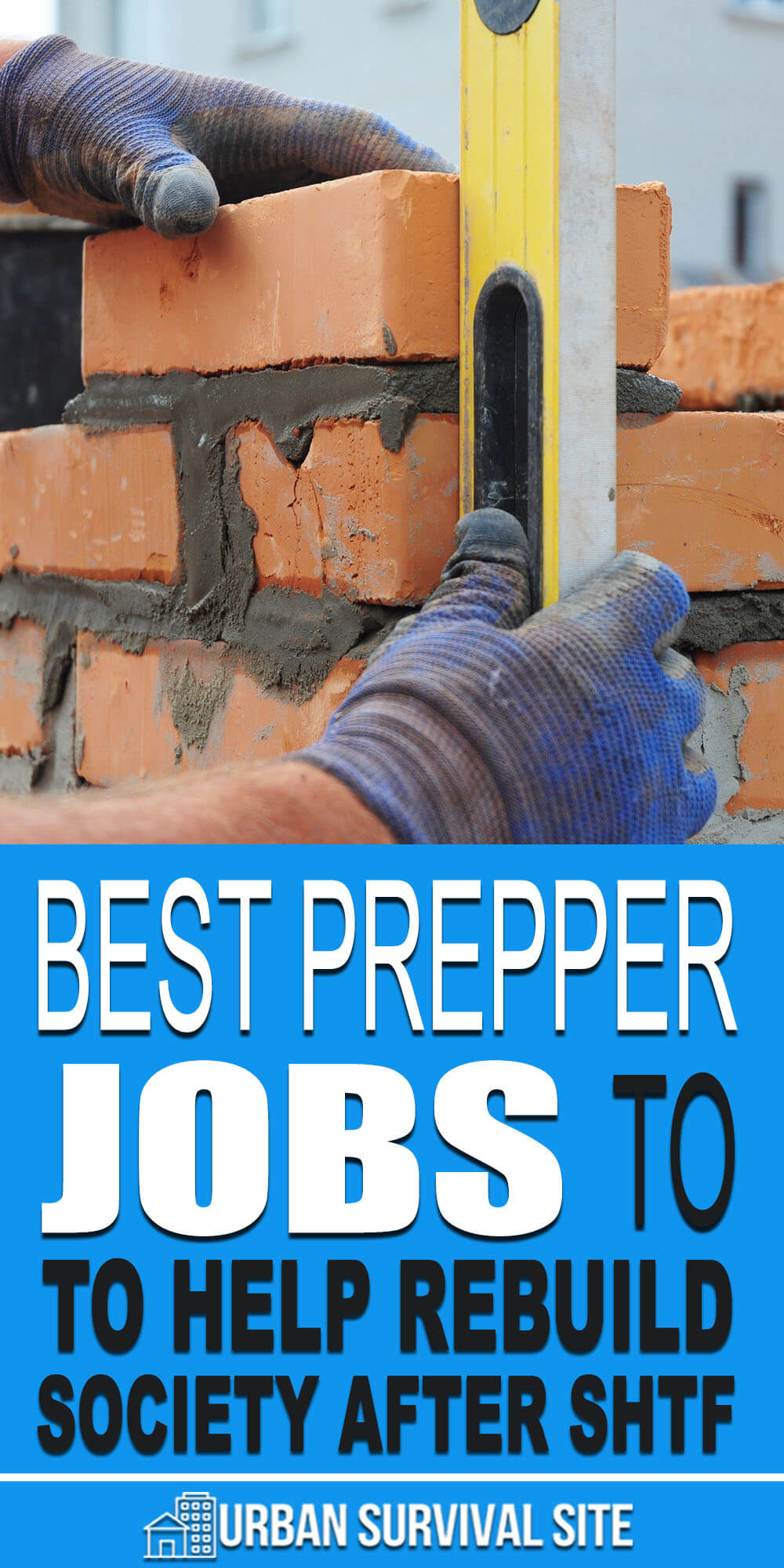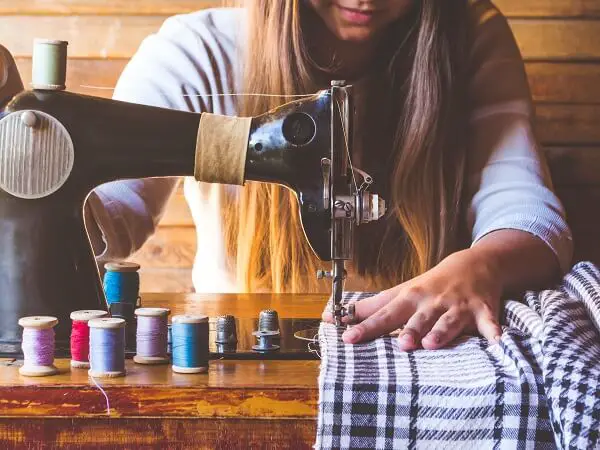Best Prepper Jobs To Help Rebuild Society After SHTF was first published to Total Survival


 During a long-term TEOTWAWKI disaster, all of your attention and energy will be focused on surviving each day. Now is the time to prepare, not just for an SHTF event, but for what comes after. Survivors will be tasked with rebuilding their communities, and ultimately society as a whole.
During a long-term TEOTWAWKI disaster, all of your attention and energy will be focused on surviving each day. Now is the time to prepare, not just for an SHTF event, but for what comes after. Survivors will be tasked with rebuilding their communities, and ultimately society as a whole.
After a mega disaster, the dollar bills in your pocket will be as useless as a college degree. Unless that education is in a field that would be useful for a nineteenth-century existence.
Want to save this post for later? Click Here to Pin It on Pinterest!
Bartering and precious metals will once again become the accepted currency in the post-apocalyptic world. The wise prepper will figure out how to turn his or her self-reliance hobbies and skills into a lucrative “income” during the reconstruction stage that will emerge after a long-term disaster.
So what will be the best “careers” for preppers after the collapse? Here are 25 possibilities.
25 Best Post-Disaster Prepper Career Choices
1. Medical Workers
Of course, any person with a medical degree of any type will be in high demand and handsomely rewarded by SHTF survivors. But one does not have to be a doctor or nurse to offer something of value to the community.
It would be wonderful if every doctor or nurse survived the TEOTWAWKI event; they surely would be taken in and protected by prepper families. But such an assumption would simply not be realistic, especially if you live in a rural area.
First responders (EMTs, paramedics, and firefighters) also have advanced first aid training. Most athletic coaches and school teachers are also certified in first aid and communicable diseases. Taking classes to get certified and advance your knowledge would be wise. It will give you something valuable to barter after a disaster when doctors and nurses are in short supply.
Related: 9 Most Important First Aid Skills To Learn
2. Vets
A veterinarian or assistant vet can also use his or her skills to help treat humans when no longer bound by laws preventing the giving of such care. Every farmer and homesteader I know has acted as their own vet at least a few times.
Advancing your livestock skills so you can render aid to sick or injured animals is highly advisable as well. Losing a cow is upsetting to a keeper now, but after an SHTF event, it would be a tragedy that could leave the family incredibly hungry.
Related: Protect Your Livestock From Deadly Diseases
3. Herbalists
Herbalists, whether professional or amateur, will become the post-TEOTWAWKI pharmacists. Growing and foraging for your own natural remedy ingredients, preserving them, and learning how to treat a broad range of conditions could not be recommended more highly.
The general populace doesn’t know how valuable the weeds in their backyards truly are, or how to make a fever tea, burn tincture, or elderberry cough syrup. A portion of the family’s prepping budget would be well spent investing in healing herbs and roots that cannot be grown in your area. You should also consider getting a manual capsule maker, as well as lots of capsules in various sizes.
Related: How To Make An Herbal Medicine Chest



4. Butcher
Raising your own meat will be vital to the everyday life and health of survivors. Knowing how to butcher meat will be yet another prime bartering skill or prepper career choice.
Preppers who raise their own livestock and hunt probably already know how to butcher their own meat and have the means to do so. Gone will be the rigid government rules and health department inspections that prevented you from offering butchering services to community members before the SHTF.
5. Blacksmith
Horses, not cars, will fill the roads once it is safe to travel after a long-term disaster. The demand for tools, gates, horseshoes, fencing, wagon wheels, and weapons for members of the new society will make this rare skill popular again.
Related: Blacksmithing Basics – 7 Things You Need To Know
6. Carpenter
The ability to work with wood without the aid of power tools will make preppers with carpentry skills vital to the rebuilding efforts. Chicken coops and goat pens will dot the landscape of every home – and someone must have the skills and tools to build them.
Homes and barns will need to be repaired, foot or horse bridges will need to be constructed, and scores of other home and infrastructure projects will need to be completed.
7. HAM Radio Operators
Any HAM operators that still have a functioning radio will be able to connect with the outside world and serve as the “newsman” or woman in the developing community.
If a band of marauders is headed toward the town, a pandemic is spreading in your direction, or some semblance of government is reforming, you will definitely want to know about it and plan accordingly.
Related: Read This Before You Buy a Ham Radio
8. Masons
Skilled tradespeople of all varieties will be needed to build and repair structures, bridges, and roads. Homes without a fireplace or wood stove will need them built to keep the family warm and to give them a cooking surface.
9. Beekeepers
A beekeeper can obviously sell honey for eating, food preservation, and medicinal purposes, but a beekeeper can also barter for use of bees to pollinate crops and sell beeswax for making candles and salves.
10. Teachers
One-room schoolhouses or even large living rooms will become places of learning during the first generation after the collapse of society. Children won’t be sitting in desks all day while being treated like robots. Instead, they’ll quickly learn the basics of reading, math, science, and social studies before spending the rest of their days developing vocational skills as apprentices.
An education degree will no longer be required to teach children, but supplies and some type of experience in this area can help a survivor establish a marketable skill to the community in exchange for firewood, food, and medical care.
Related: 7 Survival Skills They Should Teach In School
11. Cooper
Learning how to make barrels for storing food and materials, and to make buckets for hauling water for the fire brigade, will also be a useful post-SHTF career choice.
12. Seamstress
Clothing will become exceptionally worn during a long-term disaster when manual labor is part of daily life. Children will grow and new babies will be born – they too will need a regular supply of clothing. Investing in a manual sewing machine, practicing sewing skills, and stockpiling supplies can help an avid sewer turn a hobby into a full-time job or stable bartering skill.
Search the internet for free sewing patterns and print them on sturdy cardstock paper for use after the long-term disaster. Hit yard sales and buy every cheap item of clothing you can find to stockpile for barter or use as fabric. Think outside the box and buy sheets, tablecloths, and even curtains that can be used to make clothing, outerwear, and bags.
Related: Needle & Thread – Sewing 101



13. Leathercrafters
A leather artisan will be able to barter his or her services to make or fix saddles, create gun holsters and knife sheaths, make and repair footwear, and create bags.
14. Potter
Finding a manual pottery wheel is not an easy thing to do. It took me three years to find one… and they are not cheap. Learning how to harvest your own clay from the ground and how to fire it in a homemade kiln will allow a survivor to make cookware and storage containers in the new society.
15. Gunsmith and Reloaders
Building and repairing firearms after a long-term disaster, as well as making ammo to sell to community members, could turn you into a post-apocalypse millionaire. There is a risk associated with this prepper career because the guns could fall into the wrong hands and set your home up for a deadly robbery.
Related: How To Make Old-Fashioned Gun Powder
16. Sawyer
A woodcutter will be able to barter firewood and deliver it to community members and emerging businesses in the new society. This will be a year-round business even in warm climates because wood will be the primary fuel, not just for heating homes, but also for cooking and blacksmithing.
17. Rope Maker
Turn this bushcraft skill into a new career to help the community during the reconstruction phase. Ropes will be used to lift heavy objects since mechanical machinery will likely have ceased to function.
Rope will also be used to secure goods on wagons, keep satchels and baskets closed, and for a myriad of other tasks in the 1800s-era existence we will find ourselves in after a TEOTWAWKI disaster.
18. Tinker
The ability to make useful tools and cookware out of tin will be a valuable skill in a society that no longer has access to stores and disposable kitchen goods that were once carelessly purchased and tossed away.
19. Distilled Spirits
Moonshine will once again be brewed far more freely, along with other spirits and liquid morale boosters. You need not open a saloon to sell your great papaw’s apple pie recipe, but doing so would vastly increase your new world income opportunities.
20. Trading Post
Open a trading post or old fashioned general store and barter with other residents. This spot could also be a gathering hub for the survivors to enhance the sense of community and to get news from travelers.
21. Cobbler
A shoemaker and repair person who stockpiled the necessary materials (including boot laces) should see a steady flow of customers. If you could combine this skill with leather making, a great bartering income potential will exist.
22. Basket Weaver
Learn how to weave baskets as well as game and fish holders to trade with community members or barter for services in the post-SHTF society.
23. Wheelwright
The wagons pulled by horses will need wheels made and repaired on a regular basis. Wheels can also be used to turn water into an energy source and as part of windmills.
24. Water Hauler
Not every community member will live near a creek or pond or have a well and manual pump. The ability to haul water and build rainwater catchment systems will be yet another valuable skill after a long-term disaster.
25. Hunter or Angler
Barter your hunting and fishing skills with members of the community who make goods or provide other services. Combining this service with the ability to butcher meat would provide you with an even more lucrative post-disaster business.
Conclusion
Devote some time to determining which society rebuilding service or business best suits your existing skill set and the region where you live. Once you have decided on one or two post-SHTF careers, set aside part of the family prepping budget to stockpile tools and supplies for the endeavor. And in the meantime, work on your skill set as much as possible.
Surviving the disaster remains every prepper’s primary focus, but planning for what comes next will be essential to the longevity of your family.
Like this post? Don’t forget to Pin It on Pinterest!
This article first appeared on urbansurvivalsite.com See it hereThis Article Was Found Here: Best Prepper Jobs To Help Rebuild Society After SHTF

No comments:
Post a Comment